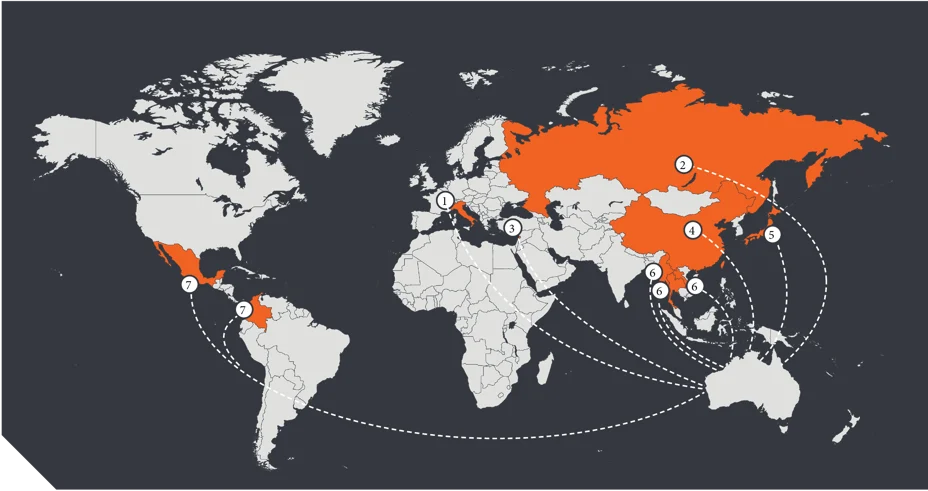Seriously organised: Australia’s criminal underbelly
In 2021, Operation Trojan Shield, Australia’s largest law enforcement drive to counter organised crime, revealed the industrial scale of organised crime groups (OCGs). Estimates put the number of OCGs operating in Australia anywhere between 100 to 300, with over 30,000 members. With most groups retaining chapters or representation around the country, the scale and organisation of Australia’s OCGs are comparable to large corporations. They operate complex international supply chains that allow for illicit products to penetrate the borders of Australia and other jurisdictions, generating billions of dollars that are laundered through front-companies, casinos and cryptocurrency. While Operation Trojan Shield led to the identification and eventual arrest of 200 organised crime group members, the effort merely created a temporary dent in the country’s extensive and entrenched OCG activity. The Australian Taxation Office estimates that organised crime costs the Australian economy up to USD 60 billion annually when considering lost taxes, fraudulent practices, criminal activity and the social costs of OCGs.
Illicit affairs
The primary activities of most major OCGs in Australia involve some form of drug trafficking, illicit firearm sales or human trafficking. The market for synthetic drugs in Australia is significant and growing considerably. In 2022, Australians were estimated to have spent around USD 10 billion on illegal drugs, up from USD 9 billion in 2021. The Port of Newcastle, Australia's largest coal port, has long served as a gateway into Australia for international drug and illicit firearm importers. Additionally, over the past decade Australia has remained a destination country for various forms of human trafficking, primarily sexual exploitation and forced labour.

Tracing the global origins of organised crime in Australia
While some OCGs – such as outlaw motorcycle gangs – have domestic roots, research by the Australian Institute of Criminology estimates that 70 percent of organised crime activity in Australia has international links.
(1) Italy: Some of the oldest and most established organised crime groups in the country have their roots in the ‘Ndrangheta – a prominent Italian mafia-type organised crime group originating from the region of Calabria. Despite the ‘Ndrangheta’s foreign origins, its representation in Australia is presumed to now be independent of the group’s international activities and a considerable proportion of its members are naturalised Australian citizens.
(2) Russia: Russian organised crime infiltrated Australia following the fall of the Soviet Union.
(3) Lebanon: The emergence of Middle Eastern crime groups, primarily with links to Lebanon, can be traced back to the 1990s.
(4) China/Taiwan: Gambling tourism and the drug trade have seen organised crime with Northeast Asian links proliferate across the country.
(5) Japan: The Japanese Yakuza’s operations in Australia date back to the 1980s.
(6) Thailand, Laos, Myanmar: A considerable portion of Australia’s drugs originate from Southeast Asia’s ‘Golden Triangle’, providing an opportunistic gateway for the region’s gangs to gain a foothold in Australia.
(7) Mexico and Colombia: South American organised crime groups are increasingly penetrating Australia’s neighbouring countries such as Papua New Guinea and using trade links to smuggle their wares into Australia.
Manifestations on the ground
Organised crime poses a national security and public safety challenge for Australia. The Australian Criminal Intelligence Commission reported that firearm trafficking by OCGs has resulted in over 260,000 illegal firearms circulating across Australia, increasing the risk and severity of violent crimes. In 2020, of the 453 kidnapping cases recorded in Australia, 210 took place in New South Wales where OCG activity is concentrated. Kidnap victims are often subjected to high levels of violence and brutality by contractors hired by OCGs. Virtual kidnappings perpetrated by Chinese and Taiwanese organised crime groups based outside Australia are also on the rise, targeting wealthy individuals and foreign university students.
Organised crime costs the Australian economy up to USD 60 billion annually.
As well as kidnappings, murders are also symptomatic of heightened organised crime activity. Turf wars, attempts to expand operational territory, and long-standing rivalries are commonly solved through gun fights. While uncommon, the have been reported incidents of civilian bystanders getting caught in the crossfire of these stand-offs. The drug and firearms trade is fuelling increased violence, particularly as the operating landscape is becoming more concentrated. There are other important socio-economic costs of OCG activity to consider. In 2021, nearly 1,800 drug-induced deaths were recorded across Australia – equivalent to five deaths per day. The country’s financial markets are further disadvantaging from extensive money laundering operations to conceal money from illicit activities. And, OCGs in Australia have been increasingly linked to the growing rate of cyber theft and online investment scams across the country.
While organised crime in Australia primarily affects the local population, the prevalence of OCGs and the expansion of illicit markets in Australia have the ability to undermine institutions, businesses, public services and public safety, preserving companies’ and travellers’ exposure to a myriad of risks.
